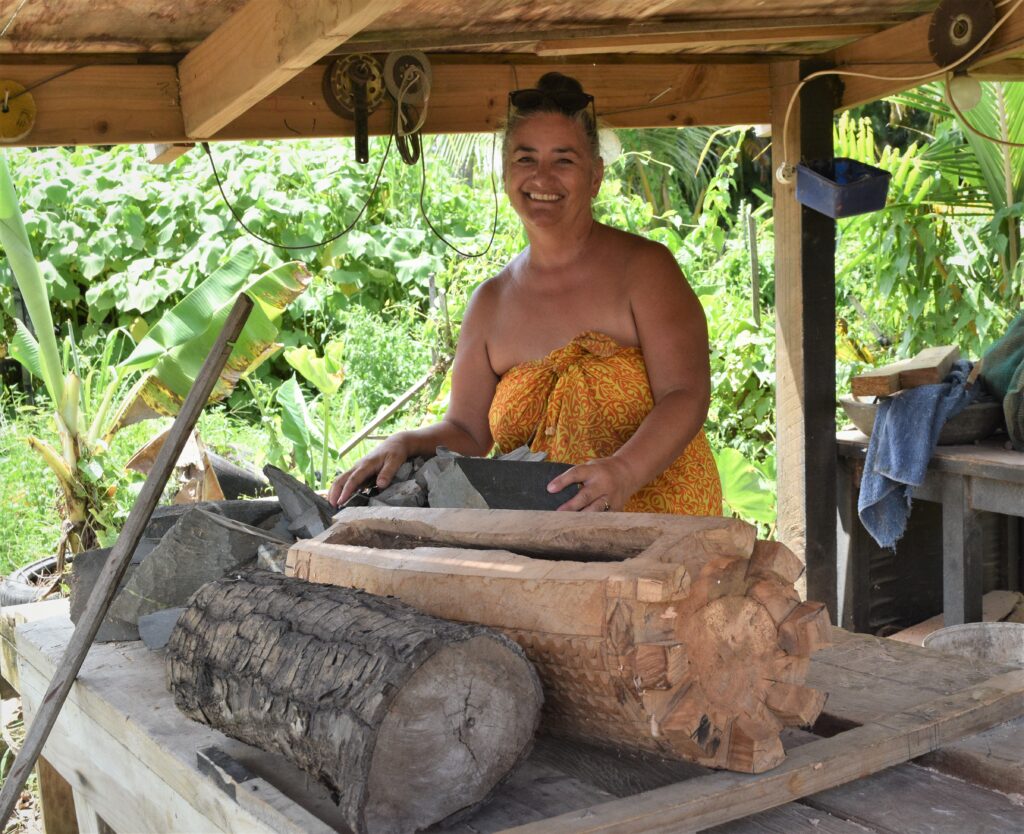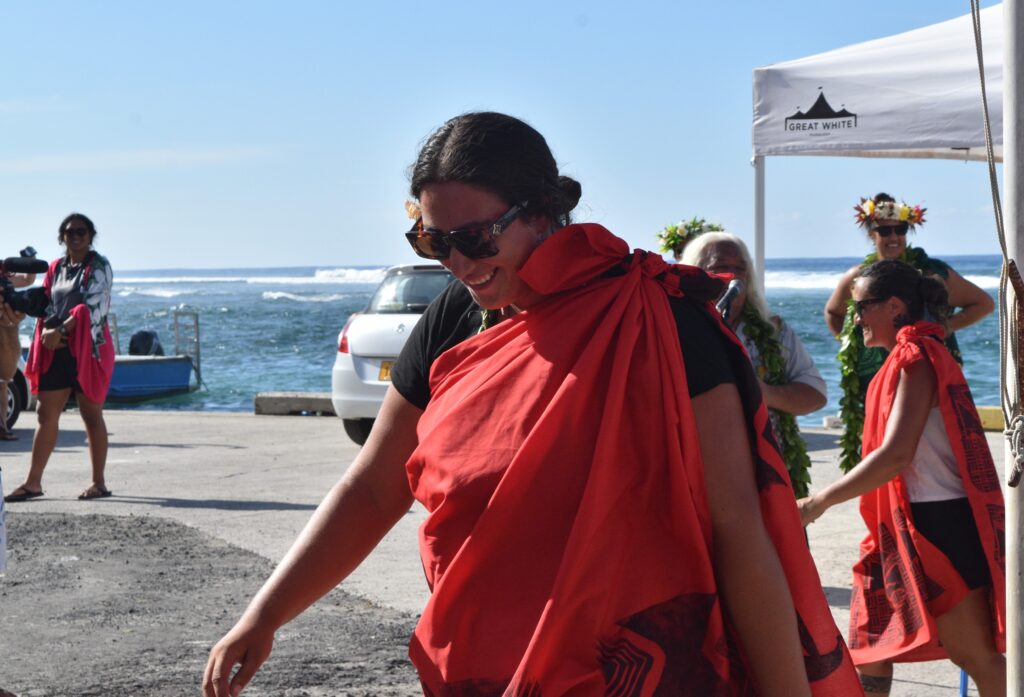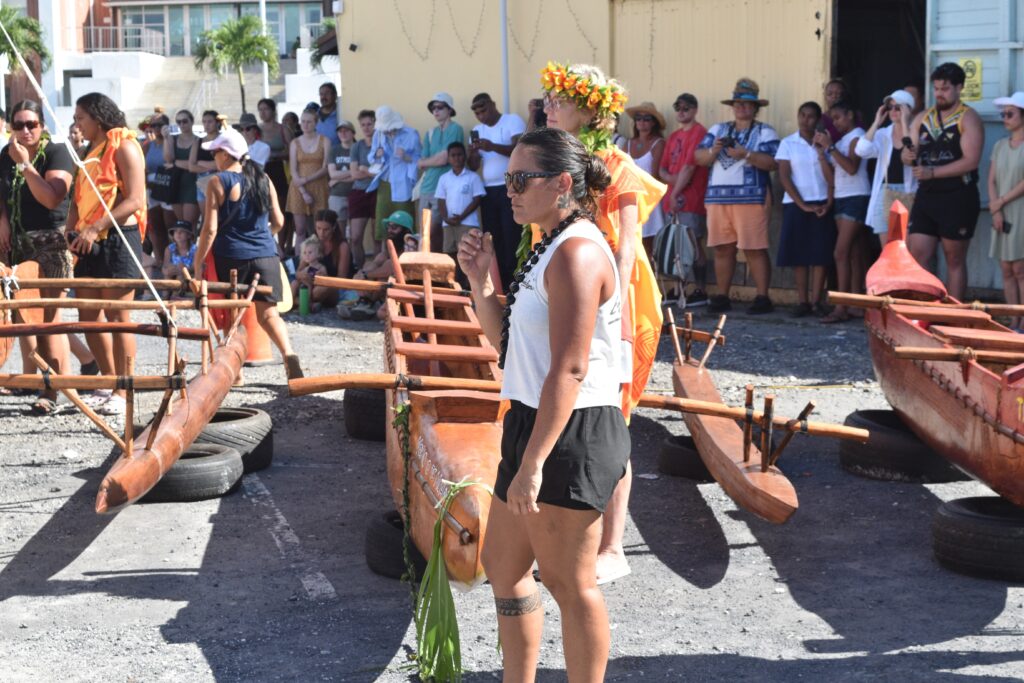Women carve their place in traditional art
Saturday 25 February 2023 | Written by Melina Etches | Published in Culture, Features, National

Sharnyta Henry was inspired by her brother David Maruariki to have a go at carving. 23022420
Master carver Ta’unga Mike Tavioni BEM believes in women carvers and that they should be encouraged to practice the art.
At the launch of Te Mana O Te Vaka, the canoe building and sailing project, Tavioni announced the promotion of three women – Bernie King, Pounamu Tipiwai-Chambers and Sharnyta Henry – to the status of vaka carvers.
“I treat women the same as men, like the double hulled canoe the women is equal to the men,” says Tavioni, adding not like in Aotearoa New Zealand, Hawaii and some Pacific Islands “where if you are a woman, you can’t carve the canoe”.
From 1997 to 2007, Tavioni led a cultural team to Hawaii for the vaka/canoe building festival.
He was the only person who took along a female carver, his wife Awhitia, who is highly respected as an artist and master carver.
“I was the only one who supported women carvers,” says Tavioni.

In Hawaii he openly condemned the men who refused to allow women to carve saying “you are chauvinists, you think women don’t count”.
“Mama (Awhitia) is the only woman canoe builder in the Pacific, she can start a log and complete it; and she has a bronze medal from one of the South Pacific Games for racing the canoe with our daughter Tatiana,” says Tavioni.
Tavioni acknowledges that now women in island territories are exerting their rights and in Aotearoa, women are now taught how to carve.
A female carver from Aotearoa used her skills in Te Mana O Te Vaka project, she came to Rarotonga to learn vaka carving.
Tavioni is convinced King, Tipiwai-Chambers and Henry are female carvers who can carve a vaka if they want to. “I know they can,” he says.
“All these women can use a chainsaw.
“They are not master carvers but they can be if they want to, they have all the ingredients if they wish to.”

Henry was inspired by her brother, David Maruariki, an experienced carver who visited Rarotonga to help with Te Mana O Te Vaka.
“The whole time I’ve lived here I never took much interest in what was happening here at the Tavioni Gallery until my brother came and now I like to spend my spare time here,” says Henry.
“It turned out that I feel really passionate about carving and just seeing how talented my brother (David) was just motivated me.”
Henry says although the vaka building project is finished she will continue to visit Tavioni and Awhitia at the gallery.
“Having Papa Mike here to teach us, teach us how to use the tools and support women carvers is great.
“I admire him and that he treats us the same as the men, we are equal.”
Magarita Vaetoru first had a dab at carving at the age of 12 when she was living in Aotearoa.
A neighbour who was an Englishman had a little souvenir shop in town and taught the kids in their area how to carve including her brother, the late Paul Vaetoru.
“My brother carried carving, he did a whole marae nui for his school certificate, and he would carve all sorts of things so when he went to live in Manihiki he continued there and used to make jewellery, trophies and fix things,” shares Vaetoru.
Vaetoru says she always wanted to stop in at the Tavioni Gallery and while she was in between jobs, she took the opportunity to pop in.

Over a year ago, she started carving a kumete guided by Tavioni who taught her how to use the larger chisel and sanding.
“I like starting from scratch and carving is traditional, I like the feel of the tools.
“He (Tavioni) always told me to make mistakes, but I don’t like making mistakes so I’m a slow carver.”
Carving is working with dust, lots of it, says Vaetoru, “before I would worry about the dust in my hair and now I don’t care”.
Vaetoru enjoyed the experience of working on the vaka building project and says she probably will continue vaka carving. The only thing she can’t do is operate a chainsaw.
“I’m onto stonework now which I love,” adds Vaetoru.
Tavioni is happy to see more women take an interest in the art of carving and holds women in high esteem.
“I value women more and women are equal to men,” says Tavioni.
“You look in the home, without women everything will be chaos.
“And the first education children get is from the women, not from the men; and if the men don’t provide food, the women make sure they find some food, so I have no respect for men.
“The men do what they think is right … all over the world the men are made to think that women are made to serve them, that’s b------t.
“If you are honest with yourself, who does most of the work at home?”














































